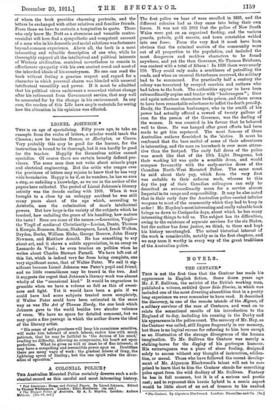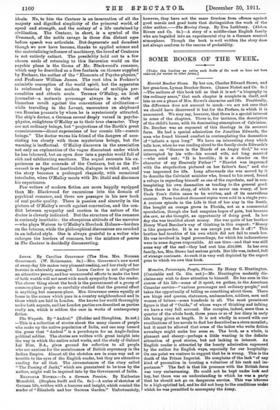NOVELS.
THE CENTAUR.•
Tins is not the first time that the Centaur has made his appearance in English fiction. Some dozen years ago Mr. J. F. Sullivan, the satirist of the British working man, published a volume, entitled Queer Side Stories, in which was included one of the most diverting absurdities that in a pretty long experience we ever remember to have read. It described the discovery, in one of the remote islands of the 2Egean, of a solitary survivor of the race of Centaurs, and went on to relate the sensational results of his introduction to the England of to-day, including his running in the Derby and his appearance in the police court. The memory of Mr. Hay, as the Centaur was called, still lingers fragrantly in our memory, but there is no logical excuse for referring to him here except as an illustration of the strange divergences of the human imagination. To Mr. Sullivan the Centaur was merely a stalking-horse for the display of his grotesque humour. His extravaganza was a piece of sheer fooling, designed solely to amuse without any thought of instruction, edifica- tion, or moral. Those who have followed the recent develop- ment of Mr. Algernon Blackwood's talent will not be sur. prised to learn that to him the Centaur stands for something poles apart from the wild drollery of Mr. Sullivan. Fantasy he has in full measure, but it is of a. serious and poetic cast; and to represent this heroic hybrid in a comic aspect would be little short of an act of treason to his exalted
• The Centaur. By Algernon Blackwood. London: Macmillan and Co. (Ga.].
ideals. No, to him the Centaur is an incarnation of all the majesty and dignified simplicity of the primeval world, of speed and strength, and the ecstasy of a life unstained by civilization. The Centaur, in short, is a symbol of the Urraensch, of the noble savage in those dim distant ages before speech was articulate. But degenerate and decadent though we now have become, thanks to applied science and the materializing influence of machinery, the breed of Centaurs is not entirely extinct. The possibility held out to a few chosen souls of returning to this Saturnian world on the psychic plane is the theme of Mr. Blackwood's romance, lvhich may be described as a free fantasia on themes supplied by Fechner, the author of the " Elements of Psycho-physics," and Professor William James. The root idea is Fechner's animistic conception of the world spirit, but the apparatus i3 reinforced by the modern theories of multiple per- sonalities and etherie souls. Terence O'Malley, an Irish journalist—a meteoric personage always in a state of blameless revolt against the conventions of civilization— while travelling in the Levant, encounters on shipboard two Russian peasants by whom he is mysteriously attracted. The ship's doctor, a German savant deeply versed in psycho- physics, enlightens O'Malley as to their true character. They are not ordinary beings, but " projections of the Earth's great consciousness—direct expressions of her cosmic life—cosmic beings." The doctor warns his friend of the dangers of asso- ciating too closely with these mysterious beings, but the warning is ineffectual. O'Malley discovers in the association not only an explanation of the vague discontent under which he has laboured, but an open door into a psychic world full of rich and exhilarating emotions. The sequel recounts his ex- periences as the comrade of the Centaurs, but as the Ur- ozensch is ex hypothesi inarticulate, dialogue is ruled out, and the story becomes a prolonged rhapsody, with occasional interludes, when O'Malley meets with Dr. Stahl and discusses his experiences.
Few writers of modern fiction are more happily equipped than Mr. Blackwood for excursions into the domain of psychical romance, and there are passages in his new book of real poetic quality. There is passion and sincerity in the picture of O'Malley's revolt against convention, and the con- flict between sympathy and caution in the nature of the doctor is cleverly indicated. But the structure of the romance is curiously inartistic : the obsequious attitude of the narrator —who plays Watson to O'Malley's Sherlock Holmes—borders on the fatuous, while the philosophical discussions are couched in an inflated style. One is always grateful to a writer who enlarges the borders of romance, but the mixture of genres in The Centaur is decidedly disconcerting.







































 Previous page
Previous page